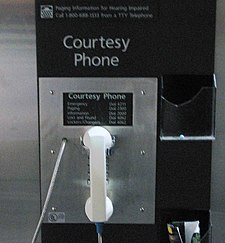

A courtesy telephone is a telephone located in airport terminals, large train stations, hotel lobbies, and other places where many travellers are expected, which is used to relay messages to a specific person.
It is typically used in connection with a public address system announcement of the style "Gwen Cooper, please pick up the nearest white courtesy telephone." Courtesy telephones may have a distinctive color, which is traditionally white in US airports, [1] and most have no dialing capabilities but rather are simple ringdown stations to reach an operator or other fixed number. [2] Some double as emergency telephones, having buttons by which a user can distinguish between emergency use and inquiry. [3]
Customers can use a courtesy phone to seek information, such as where to find further transport or a person trying to meet them. Some courtesy phones provide a direct line to a number of advertised businesses, such as motels or taxis. [4] [5] They may be located near baggage claim, ticketing areas, and security checkpoints. [6]
Other telephones in public or semi-public places which may be used to make outside calls are also sometimes called "courtesy telephones".
In popular culture
Courtesy telephones are featured prominently as a running gag in the cult comedy film Airplane!.
The songs "Sharkey's Day" and "Sharkey's Night" from Laurie Anderson's 1984 album Mister Heartbreak include the line: "Paging Mr. Sharkey. White courtesy telephone please."
See also
References
Notes
- ^ Rick Belliotti (2008), Common use facilities and equipment at airports, p. 10, ISBN 978-0-309-09805-2
- ^ Scott Keagy (2000), "Private Line Automatic Ring-Down", Integrating voice and data networks, p. 603, ISBN 978-1-57870-196-4
- ^ Peter, John. "Telefonansagen". Retrieved 22 March 2023.
- ^ "Council okays airport phone center", The Southeast Missourian (February 4, 1987), page 4. Retrieved July 9, 2011
- ^ "Taxis". Yankee Landing. Archived from the original on January 14, 2011. Retrieved July 16, 2011.
- ^ Ngcobo, Sipho "Airport approves advertising contract", The Times-News, (March 20, 1990), page 3. Retrieved July 9, 2011